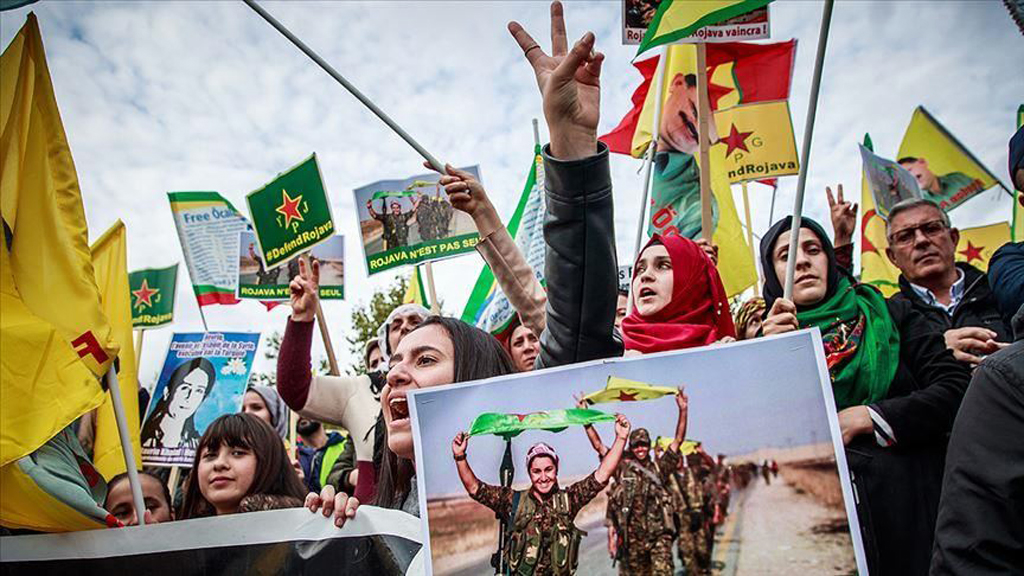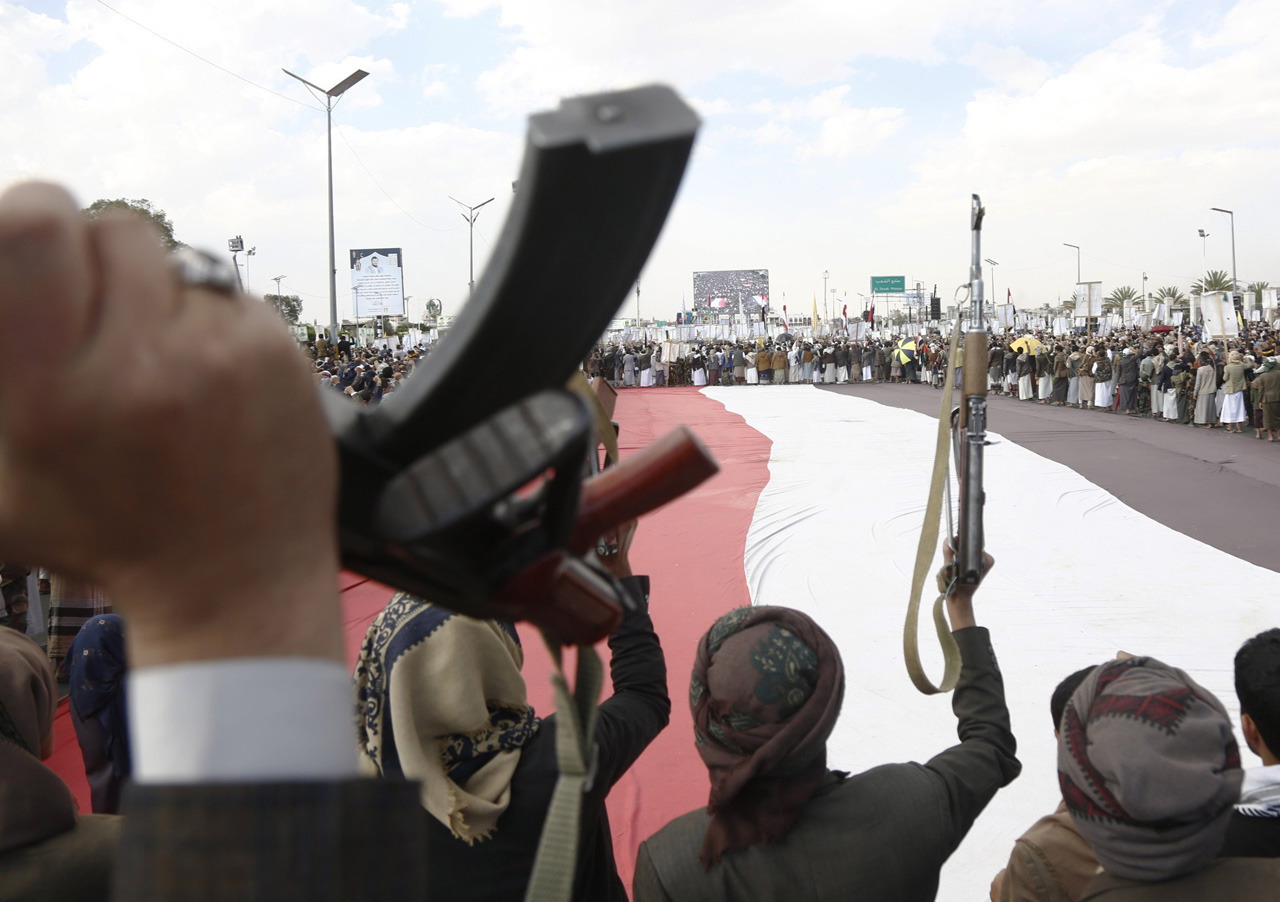[Daily Sabah, 8 January 2020]

Germany favors YPG among terrorist groups, disregarding the law
The conduct of German authorities toward terrorist groups varies as the country favors some, such as the YPG, hesitating to hold the terrorists accountable under the law and disregarding judicial requirements.
Share
The conduct of German authorities toward terrorist groups varies as the country favors some, such as the YPG, hesitating to hold the terrorists accountable under the law and disregarding judicial requirements.
According to section 129b of the German criminal law, titled "Criminal and terrorist organizations abroad; extended confiscation and deprivation," Germany has the right to prosecute an offense if it is "exercised within the Federal Republic of Germany or if the offender or the victim is a German or is found within Germany." It also states that these aforementioned suspects can only "be prosecuted on authorization by the Federal Ministry of Justice. The authorization may be granted for an individual case or in general for the prosecution of future offenses relating to a specific organization." This section clarifies the fact that the law specifically includes the criteria defining who is a member of a foreign terrorist group.
However, although the law outlines the conditions for the German government to act against the foreign terrorist groups and their nationals who are participating in them, there is no clear pattern in the implementation of this law since the practice differs from one terrorist group to another.
An article released on Deutsche Welle (DW) English on Tuesday reveals this hypocritical stance of Germany and shows that the German nationals who were once members of the Daesh terrorist group face convictions while the ones who were in YPG somehow manage to evade the law.
The article points out that the confirmation of this claim came from both the Interior Ministry and the Federal Criminal Police Office in November upon an official parliamentary inquiry, which stated that "none of the YPG returnees is currently classified as a threat," while almost half of the 122 Daesh returnees are regarded as potential threats to the public safety." While 23 Daesh terrorists have been charged with being a member of a foreign terrorist organization, none of the 100 YPG terrorists have faced any charges yet, despite the fact that investigations were launched on some of them. This is an obligation under German law since it orders authorities to initiate an investigation if there is suspicion of a crime.
"According to the current practice of the Federal Prosecutor's Office, the investigation proceedings are generally terminated," DW reported, citing a confirmation statement from the Federal Prosecutor's Office that was provided to them as an explanation of the current stance toward the YPG.
The PKK has been banned in Germany since 1993, but it remains active, with nearly 14,500 followers among the country's Kurdish immigrant population. Back in 2018, Germany's domestic intelligence service identified the PYD and the YPG as the affiliates of the PKK terrorist group and a threat to internal security.
The terrorist YPG/PKK group recruited nearly 270 foreign fighters from Germany who took part in battles and terror attacks in Syria and Iraq, a report by German domestic intelligence agency BfV revealed in November. In an analysis published in BfV's quarterly newsletter, the agency said among the 270 YPG/PKK foreign fighters who traveled to the region since 2013, at least 22 were killed in clashes or during Turkey's anti-terror operations.
Although this hypocritical stance of German authorities can be explained by stating that Daesh is recognized as a terrorist group in Germany while YPG is not, the fact that the PKK, a group that the YPG is openly affiliated with, is recognized as a terrorist group by both Germany and the EU still raises the questions of hypocrisy. The article itself acknowledges that YPG is the Syrian offshoot of the PKK.
Speaking to Daily Sabah on the issue, Bilgehan Öztürk, Research Assistant in the Department of Security Studies at SETA Foundation, said it is not easy for Germany to take action against the PKK since the group has not committed any terrorist activity within the country since 1993, unlike its actions in Turkey. Besides, in Öztürk's opinion, Germany evaluates the PKK's activities within the freedom of expression while not seeing the terrorist group as a priority to tackle. "Germany would not take action against the PKK by itself. It would use this option as leverage in exchange for something that would suit its interest that Turkey would have to sacrifice," Öztürk said, implying that in the end, Turkey's efforts could push Germany to make a move against the PKK.
The DW article refers to political motives as the main reason behind this difference between the two terrorist groups in Germany. It claims that Germany sees the YPG as a valuable tool in the fight against Daesh, even implying that they are the "good terrorists."
It states that Germany is in a "dilemma" in its actions toward the terrorist group since the YPG is ideologically on the same page with the PKK, carrying the pictures of jailed PKK leader Abdullah Öcalan wherever they go, while following the PKK's ideology in their actions as well.
"The German government is trying to find a balance between the YPG on the one hand and Turkey's wishes on the other. That cannot succeed," the article said, quoting Omid Nouripour, the foreign policy spokesman for the Green Party parliamentary group, revealing once again the deeper political motivations of Germany's "dilemma."
Underlining the fact that neither Europe nor the U.S.' top authorities have officially acknowledged the connection between the PKK and the YPG, Öztürk reiterated that many European countries, as well as the U.S., have actively supported the YPG under the pretext of the fight against Daesh by providing equipment and training.
"Germany (compared to the U.S. and many other European states) has many military deficiencies. In order to compensate for these deficiencies, Germany has taken on duties in Syria by training and providing consultancy to the YPG while receiving intelligence in return," said Öztürk.
Ankara has long criticized German authorities for not taking serious measures against the PKK and its Syrian affiliate YPG – which continue to use Germany as a platform for their fundraising, recruitment and propaganda activities.
Despite its international status as a terrorist organization, the PKK has enjoyed relative freedom in European cities and has a particularly strong presence in Germany. PKK supporters have been allowed to hold rallies, recruit militants and collect funds in Germany.
According to Öztürk, labeling the YPG as a terrorist group, considering the aforementioned support from Germany, would put the country in a position of cooperating with a terrorist group. "It is not realistic to expect the country to take a step that would harm itself," he highlighted.
Nouripour, however, seems to have a clearer understanding of the YPG, in contrast to the German government. Warning against the glorification of the YPG, Nouripour reminds of the terrorist group's human rights violations, such as child recruitment.
Öztürk underlined that despite Germany's Turkish community, the largest minority group in the country, reacting to the support and expressing sensitivity toward Germany's welcoming nature for the YPG, there is no reflection of this stance in the German politics.
Tags »
Related Articles






